Pope Francis

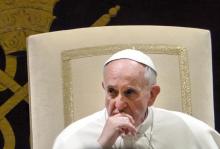
Pope Francis will meet a gay married activist in Paraguay next month, according to an LGBT rights group in that country.
The pontiff is due to meet Simon Cazal, co-founder and executive director of SomosGay, on July 11 at the Paraguayan Episcopal Conference in Asuncion, the country’s capital.
Catholic conference organizers approached Cazal earlier this month with an invitation in which they noted the “impact of your organization on Paraguayan society.”

1. Masculinity Gets Modern Makeover in Latest Getty Images Collection
Tired of seeing stock images that reinforce traditional gender roles? Getty Images is (finally) changing that with the help of Sheryl Sandberg's LeanIn.org.
2. The Human Right to Have a Home
As Congress plans to slash funding for housing assistance programs, Catholic bishops in the U.S. are protesting, arguing "housing is a human right."
3. WATCH: ‘What Are You?’ — Multiracial in America
Listen to how multiracial Americans react when they're asked "What are you?" (Hint: I's usually not well).
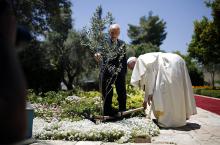
People must change their lifestyles and attitudes to help defeat hunger, Pope Francis said June 11, a hint of what may be coming in his much-anticipated environmental encyclical next week.
“We must begin with our daily lives if we want to change lifestyles, aware that our small gestures can guarantee sustainability and the future of the human family,” said Francis, addressing delegates at a conference hosted by the U.N. Food and Agriculture Organization.
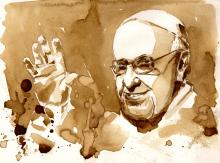
Next week, Pope Francis is scheduled to release “Laudato Sii” (“Praised be You”), his eagerly anticipated encyclical (authoritative teaching document) on the environment.
I have never seen such excitement – and controversy – surrounding an encyclical. It speaks to the extraordinary global presence Francis has achieved in a relatively short period of time. This feels to me like one of those rare moments when the Message and the Messenger can combine to change the world in a very significant way.
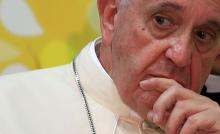
Pope Francis has approved the first-ever system for judging, and possibly deposing, bishops who fail to protect children from abusive clerics, a major step in responding to Catholics who have been furious that guilty priests have been defrocked while bishops have largely escaped punishment.
The five-point plan on accountability for bishops originated with the special sex abuse commission that Francis set up to deal with the ongoing crisis, and after some modifications, his nine–member Council of Cardinals signed off on it and Francis gave his final blessing to it on June 10.
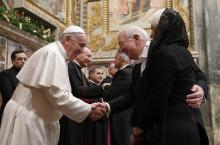
In the wake of international criticism over Moscow’s role in ongoing violence in Ukraine, the U.S. on June 10 called on Pope Francis to take a stronger stance on the conflict in his meeting with Russia’s president, Vladimir Putin.
“We think they could say something more about concern on territorial integrity, those type of issues,” U.S. ambassador to the Holy See, Kenneth F. Hackett, told journalists in Rome ahead of Putin’s arrival.
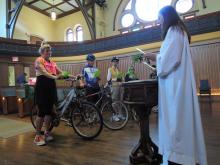
It was the sixth annual Blessing of the Bikes at the downtown church — a type of local event that has become more common as a growing number of churches consider the idea that protecting the environment is not just a scientific or political debate, but a spiritual one.
The movement has grown in the past decade and crosses denominations. An “Evangelical Climate Initiative” issued in 2006 has been signed by hundreds of religious leaders, and the Vatican held a one-day summit in late April to “elevate the debate on the moral dimensions of protecting the environment.” Pope Francis is preparing this summer to issue an encyclical — one of the most authoritative church documents — framing climate change action as a moral and religious imperative.
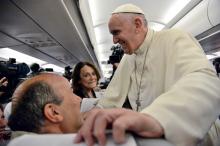
Pope Francis has decried the “filth” of online pornography and warned people against wasting time on their computers.
Speaking aboard the papal plane after his visit on June 6 to Bosnia-Herzegovina’s capital of Sarajevo, the pontiff took a two-pronged approach to modern technology.
“There are two different elements here: method and content,” he said, according to Vatican Radio.
“Regarding the method or way of doing things, there is one that is bad for the soul, and that is being too attached to the computer.”

Pope Francis on June 5 met Chilean President Michelle Bachelet, while outside in St. Peter’s Square anti-abortion protesters drew attention to one of the most controversial topics up for discussion between the two leaders.
The meeting centered around “issues of common interest” such as education and “social peace,” as a Vatican statement put it. But the most contentious topic in play was “the protection of human life,” a nod to the traditionally Catholic country’s strict abortion law, which Bachelet is trying to modify.
Earlier this year, the Chilean leader proposed changes to allow abortions in cases of rape or if a woman’s life was in danger.
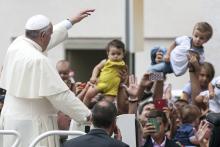
More than 300 rabbis — inspired by the climate crisis, the Torah’s call for a Sabbatical Year of releasing the Earth from overwork, and the impending Papal Encyclical on the climate crisis — have joined their voices in the Rabbinic Letter on the Climate Crisis: a call to action to prevent further climate-fuelled disasters and work toward eco-social justice.
Rabbis from across the denominational spectrum, at this writing 333 in all, signed in support of the call in less than two weeks, and their signatures continue to grow.
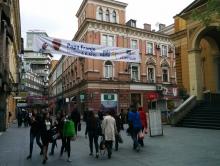
Pope Francis has promised to be a “messenger of peace” during his day trip to Bosnia-Herzegovina on June 6, but despite excitement in the country there are doubts the visit will have a lasting impact.
When the pope touches down in Bosnia-Herzegovina’s capital, Sarajevo, it will have been nearly two decades since a bloody three-year conflict came to an end.

Pope Francis praised poor families and their ability to “save society from barbarity,” on June 3, at a general audience at St. Peter’s Square in which he also named war and individualism as twin evils.
Addressing crowds of followers undeterred by the hot summer weather, the pope urged them to “kneel before these poor families.”
“They are a real school of humanity and they save society from barbarity,” he said.
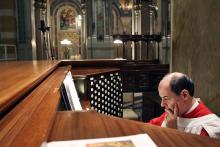
The head of liturgical music for the Archdiocese of Philadelphia, who was also to play a key role orchestrating the huge outdoor Mass concluding Pope Francis’ trip to the U.S. in September, is resigning his post over long-standing differences with Archbishop Charles Chaput.
John Romeri, who has headed the archdiocesan liturgical music office for five years, said that he will resign effective June 30 because “there are simply irreconcilable differences” with Chaput over the role and style of music at Mass.
Romeri did not respond to requests for comment, and it was unclear whether he would still play a role in preparations for the papal visit.
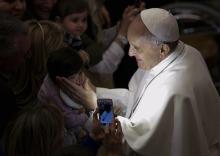
Pope Francis wants to treat the children of Italian prisoners to a train ride within the Vatican walls, a gesture intended to draw Catholics’ attention to Jesus’ command to minister to prisoners and the poor.
On May 30, Vatican guards will open a great iron gate to the “Children’s Train,” which will travel along the city-state’s only branch line for an appointment with the pope.
The chosen passengers are the prisoners’ children from Rome, Latina, Bari, and Trani.
They will have a midday meeting with Francis and will be given colored kites.
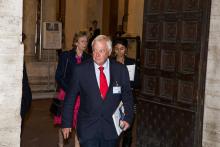
The Vatican is dragging its media machine into the 21st century, promising to promote social media and streamline its fragmented services with the help of a former BBC executive.
Lord Christopher Patten, former chairman of the BBC Trust, on May 27 outlined reform plans nearly a year after being appointed chief of the pope’s media committee.
Addressing journalists at St. Patrick’s church in central London, Patten highlighted “wasteful” duplications of media services at the Vatican and said modernization was imperative.
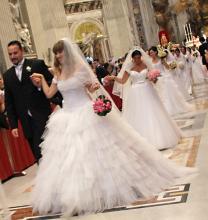
The wedding season is in full swing, and Pope Francis used the occasion on May 27 to warn couples not to marry too quickly, while also reaffirming the Vatican’s opposition to gay nuptials.
Addressing crowds of followers at his weekly general audience in St. Peter’s Square, the pontiff urged couples to take their engagement seriously.
“Betrothal is, in other words, the time in which two people are called to work on love, a shared and profound task,” he said.
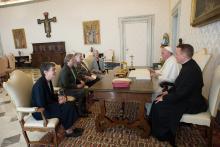
The controversial Vatican probe of American nuns that abruptly ended last month looked from the outside like a tense standoff between Rome and the U.S. sisters, punctuated by occasional public jousts that appeared to signal even tougher negotiations behind closed doors.
Not so, say the sisters, now freed to talk after both sides agreed to a month-long media blackout that ended May 15.
Those involved in the talks said that after a rocky start, the talks settled into a constructive dialogue that cleared up many misunderstandings that Vatican officials had about the sisters.
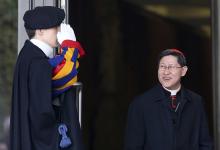
Caritas Internationalis, the global Catholic charitable organization, has elected Cardinal Luis Antonio Tagle as its new president, just months after the up-and-coming prelate welcomed Pope Francis to the Philippines.
Tagle, sometimes dubbed “the Asian Francis,” was elected on May 14 by delegates attending Caritas’ general assembly in Rome. He is the first Asian president of the organization and takes over from Honduran Cardinal Oscar Rodriguez Maradiaga, another Francis confidant, who served two terms as Caritas chief.

Sitting outside the central train station here in eastern Sicily, a 16-year-old who would only give his name as “Simon” hunched his knees up to his chest and wrapped himself up into a ball. With little spoken English, the teenager from Eritrea has taken to miming the way he traveled across the Mediterranean.
He was one of around 325 migrants crammed into an overcrowded boat that left Libya earlier this month, only to lose power a few hours into the journey.